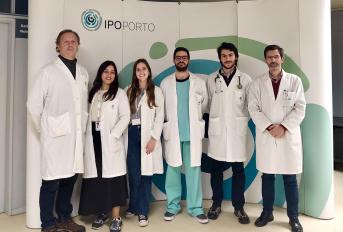Associação Portuguesa de Investigação em Cancro
Humoral Response to SARS-CoV-2 Vaccine-Boost in Cancer Patients: A Case Series from a Southern European Cancer Center
Humoral Response to SARS-CoV-2 Vaccine-Boost in Cancer Patients: A Case Series from a Southern European Cancer Center

Researchers from the Molecular Oncology and Viral Pathology Group (GOMPV) at the IPO-Porto Research Center (CI-IPOP), in collaboration with researchers from the Departments of Medical Oncology, Onco-Hematology, and Occupational Health at IPO-Porto, conducted a study on the immune response of cancer patients to the SARS-CoV-2 vaccination booster. The project focused on studying humoral immunity over time in patients who were undergoing active treatment when they received the vaccine booster dose, using a group of healthy individuals as a control. The researchers observed that IgG S (Spike) antibody levels were highest in healthy individuals, followed by patients with solid tumors, and lastly, patients with hematological malignancies. The results also showed that patients with solid tumors undergoing chemotherapy regimens with a high risk of febrile neutropenia had low IgG S levels. In summary, the results of this study demonstrated that cancer patients exhibit a low humoral immune response to the SARS-CoV-2 vaccine booster dose, with this effect being more evident in hematological patients. Additionally, chemotherapy and the risk of febrile neutropenia may also reduce the effectiveness of the immune response. The findings of this study may have significant implications for vaccination strategies and protection of cancer patients.
Júlio Oliveira, Pedro Cruz, Tânia R. Dias, Mário Sousa-Pimenta, Beatriz Almeida, Bruno Soares, Hugo Sousa, Rui Costa, Carlos Ochoa, Francisca Dias and Rui Medeiros
Instituto Portugues de Oncologia do Porto (IPO Porto)/Porto Comprehensive Cancer Center (Porto.CCC), 4200-072 Porto, Portugal
Background: Cancer patients face a greater risk of complications and death after contracting the SARS-CoV-2 virus. Booster doses of the COVID-19 vaccine were suggested to provide additional protection. This study aimed to assess how cancer patients’ immune systems respond to the booster shots and categorize their responses. Methods: We analyzed 735 samples from 422 individuals, including patients followed at the Portuguese Oncology Institute of Porto (IPO-Porto). Three cohorts were recruited, and blood samples were collected 3- and 6-months post-booster dose: cohort 1 cancer patients (also collected before the booster); cohort 2 cancer patients; and cohort 3 (healthy individuals). Humoral immune response was evaluated by analyzing IgG levels against the SARS-CoV-2 Spike (S) protein. IgG levels against the SARS-CoV-2 Nucleocapsid(N) protein was also analyzed in order to address previous contact with the virus. Results: Among Cohort 1 patients with solid tumors, when compared to pre-boost, IgG S levels increased 3 months after the boost and remained high after 6 months. Patients with hematologic tumors demonstrated lower IgG S levels at both timepoints. Comparing the IgG S levels among hematological tumors, solid tumors, and healthy individuals in both timepoints we observed that the healthy individuals had the strongest IgG S response, followed by the solid, and, lastly, the hematologic tumors. Solid tumor patients undergoing chemotherapy had reduced IgG S levels, especially those on high febrile neutropenia risk regimens. Conclusions: In conclusion, cancer patients have a weaker immune response to the SARS-CoV-2 vaccine, especially those with hematological cancers. Chemotherapy and febrile neutropenia risk further reduce booster effectiveness. Further research is needed to optimize vaccine timing for cancer patients undergoing chemotherapy.
Vaccines




